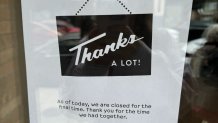A new lawsuit has been filed against Foxtrot and Dom's after the companies abruptly shut down dozens of stores without notice, laying off staff in the middle of their shifts.
The suit alleges the unexpected layoffs were in violation of Illinois' Worker Adjustment and Retraining Notification Act, also known as the WARN Act, which in many cases requires companies to notify workers before such layoffs.
The suit was filed by Jamil Ladell Moore, "on behalf of himself and other persons similarly situated," and names Foxtrot, Dom's and their parent company Outfox Hospitality LLC.
On Tuesday, two Dom's stores and 33 Foxtrots across the Chicago, Dallas and D.C. areas shut their doors for good, despite many having already been open for morning service.
"We explored many avenues to continue the business but found no viable option despite good faith and exhaustive efforts," a notice from the companies read.
Employees posted signs in doorways at multiple locations, with messages ranging from "Foxtrot closed forever (not a joke)" and "$180,000,000 in the hole" to "Closed. It was nice serving you."



"This decision has not been made lightly, and we understand the impact it will have on you, our loyal customers, as well as our dedicated team members," the message from the companies read. "We want to express our sincerest gratitude for your support and patronage throughout the years. It has been our highest honor to elevate the everyday and create a remarkable shopping experience for people who love food as much as we do. It has been a privilege serving you and being a part of your everyday lives. We understand that this news may come as a shock, and we apologize for any inconvenience it may cause. We genuinely appreciate your understanding during this challenging time."
Feeling out of the loop? We'll catch you up on the Chicago news you need to know. Sign up for the weekly Chicago Catch-Up newsletter here.
Local
According to the lawsuit, once the closures were announced, "employees were terminated immediately without any prior notice" and "several employees scheduled to work at Dom’s or Foxtrot on April 23, 2024 first learned of the mass layoff in the middle of the work-shift." Moore stated he was among those employees, learning of his termination at 11:30 a.m. that day.
The suit alleges the layoffs violate the state's WARN Act, with employees not being given the appropriate notice.
What is the WARN Act?
It's important to note there is a difference in Illiniois and federal requirements.
According to the Illinois Department of Commerce and Economic Opportunity, "under state law, employers must notify the state when they plan to lay off workers."
That law is known as the Illinois Worker Adjustment and Retraining Notification Act, also called the WARN Act.
It is specifically in place for plant closures or mass layoffs.
The law was first passed in 1988 in an effort to "provide workers with sufficient time to prepare for the transition between the jobs they currently hold and new jobs."
Who must follow the WARN Act and when?
Under Illinois law, the WARN Act applies to employers with 75 or more full-time employees. It requires such employers to give workers 60 days advance notice for a plant closure or mass layoff, which is defined as:
- 25 or more full-time employees are laid off, and they constitute one-third or more of the full-time employees at the site, or
- 250 or more full-time employees are laid off at a single site.
A plant closure is defined as the "closure of a site that employs 50 or more employees."
"A WARN notice is required when a business with 100 or more full-time workers (not counting workers who have less than six months on the job and workers who work fewer than 20 hours per week) is laying off at least 50 people at
a single site of employment, or employs 100 or more workers who work at least a combined 4,000 hours per week, and is a private for-profit business, private non-profit organization, or quasi-public entity separately organized from regular government," according to Department of Commerce and Economic Opportunity.



